|
|
|
Sort Order |
|
|
|
Items / Page
|
|
|
|
|
|
|
| Srl | Item |
| 1 |
ID:
149234
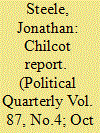

|
|
|
| 2 |
ID:
190429


|
|
|
|
|
| Summary/Abstract |
Despatching ground forces – the Field Force – to the continent constituted a cardinal element of British grand strategy from early 1934 to early 1938. In winter 1933-1934, through the Defence Requirements Sub-Committee [DRC], senior Foreign Office and Treasury officials, working with the Chiefs of Staff, advised the Cabinet to begin moderate rearmament – ultimately £52 million – with a deadline of 1939. Central to DRC recommendations was the Field Force to underwrite British maintaining the European balance of power through military support for France and the Low Countries to deter possible German aggression. When reporting in February 1934, the DRC identified two adversary Powers requiring improved British defences: Germany, the ‘ultimate potential enemy’, and Japan, of lesser importance. The War Office immediately began creating the Force, built around four divisions. In 1935, given the Abyssinian crisis, Italy joined the list of potential adversaries, and the Cabinet approved almost £400 million DRC-recommended additional defence spending, again, by 1939. The government guided by the Foreign Office monitored the balance; and War Office planning now centred on a 16-division Field Force. However, in May 1937, Neville Chamberlain rose to the premiership and initiated a defence review requiring more spending – £1.625 billion in two tranches: 1939 and 1941 – but eliminating the Field Force. Eschewing the balance, Britain would rely on powerful air and naval forces to maintain national and imperial security. However, after Germany’s conquest of Czechoslovakia in March 1939 and a darkened continental milieu, the Field Force was reborn to underpin British strategy.
|
|
|
|
|
|
|
|
|
|
|
|
|
|
|
|
| 3 |
ID:
157213


|
|
|
|
|
| Summary/Abstract |
This analysis examines the prevalence of Eurafrican thinking in the British Foreign Office throughout the late 1940s. Drawing on British and French diplomatic archives, it reveals the centricity of the Foreign Office, and British Embassy at Paris to a project largely confined to the mental map of the Foreign Secretary, Ernest Bevin. The financial stains facing Britain, often misinterpreted as “decline”, seemed a temporary phenomenon that “multilateral European cooperation” could rectify. Although shelved in 1949–1950, the Eurafrique initiative has seen few historians analyse its strategies across the corridors of power. This analysis reappraises British desires for Western European “co-operation” and a renewed faith in the Entente Cordiale as a geo-political counterweight to growing East–West bipolarity. Discussions of strategies to pool African possessions to recover the European economy were short-lived. Yet they challenged prospects of long-term economic dependence upon the United States in favour of an Anglo–French led European bloc.
|
|
|
|
|
|
|
|
|
|
|
|
|
|
|
|
| 4 |
ID:
126724
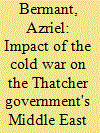

|
|
|
|
|
| Publication |
2013.
|
| Summary/Abstract |
This article argues that Margaret Thatcher's concern over Soviet ambitions was a highly significant factor behind the general agreement between 10 Downing Street and the Foreign Office (FCO) on the Middle East during the 1980s. Notwithstanding her instinctive understanding for the State of Israel, Thatcher increasingly perceived Israeli policies as a liability rather than an asset for Western interests, in view of worries that they were increasing instability in the region, and therefore undermining the security of Britain's Arab allies. Thatcher feared that the Soviets and other radical forces would exploit regional turmoil in order to expand their influence in the Middle East. Therefore, she agreed with the FCO on the urgent need to resolve the Israeli-Palestinian conflict as a means of defusing regional tensions at a time of heightened cold war friction.
|
|
|
|
|
|
|
|
|
|
|
|
|
|
|
|
| 5 |
ID:
177687
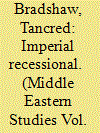

|
|
|
|
|
| Summary/Abstract |
The British imperial project in the Bahrain, Qatar and the Trucial States originated in the early nineteenth century when the Government of India signed treaties with the rulers of the sheikhdoms. It was a model of low-cost imperialism in which the British secured their economic and strategic interests. Whitehall rarely intervened until the Labour Party came to power in 1964. Domestic economic and political considerations led Harold Wilson to announce in January 1968 that the British would withdraw from the Gulf by the end of 1971. This decision was devoid of any strategic rationale, and was regarded with dismay by the rulers of the sheikhdoms. The rulers were responsible for establishing a political structure, and until the summer of 1970 the Foreign Office left them to their own devices. The election of the Conservative government in June 1970 led to a fundamental re-evaluation of the Foreign Office’s policy and Sir William Luce was appointed to establish a viable political structure for the sheikhdoms. Against the odds, Luce and the Foreign Office played a key role in creating the United Arab Emirates. Bahrain and Qatar became independent states.
|
|
|
|
|
|
|
|
|
|
|
|
|
|
|
|
| 6 |
ID:
164659
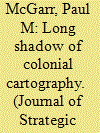

|
|
|
|
|
| Summary/Abstract |
This article examines British responses to the Sino-Indian border war of 1962. It illustrates how, in the years leading up to the war, Britain’s colonial legacy in the Indian subcontinent saw it drawn reluctantly into a territorial dispute between Asia’s two largest and most powerful nations. It analyses disagreements in Whitehall between the Foreign Office and Commonwealth Relations Office over the relative strength of India and China’s border claims, and assesses how these debates reshaped British regional policy. It argues that the border war was instrumental in transforming Britain’s post-colonial relationship with South Asia. Continuing to filter relations with India through an imperial prism proved unsatisfactory, what followed was a more pragmatic Indo-British association.
|
|
|
|
|
|
|
|
|
|
|
|
|
|
|
|
| 7 |
ID:
121905
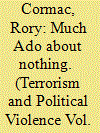

|
|
|
|
|
| Publication |
2013.
|
| Summary/Abstract |
Through its ability to transcend not only national boundaries but so too departmental jurisdictions and the traditional public-private security divide, the rise of international terrorism in the late 1960s and early 1970s posed a number of challenges to the British intelligence machinery which remain relevant today. This article focuses on the dangers and mechanics of threat exaggeration and the importance of intelligence coordination to ensure that threats are assessed and reports are disseminated in a realistic manner. Using the over-emphasised threat of maritime terrorism in 1970 as a case study, this article is able to examine the intelligence cycle as a whole and consider the importance of source validation, the dangers of incremental analysis, and the need for coordinated advice disseminated coherently to consumers both inside and outside of the government.
|
|
|
|
|
|
|
|
|
|
|
|
|
|
|
|
|
|
|
|
|